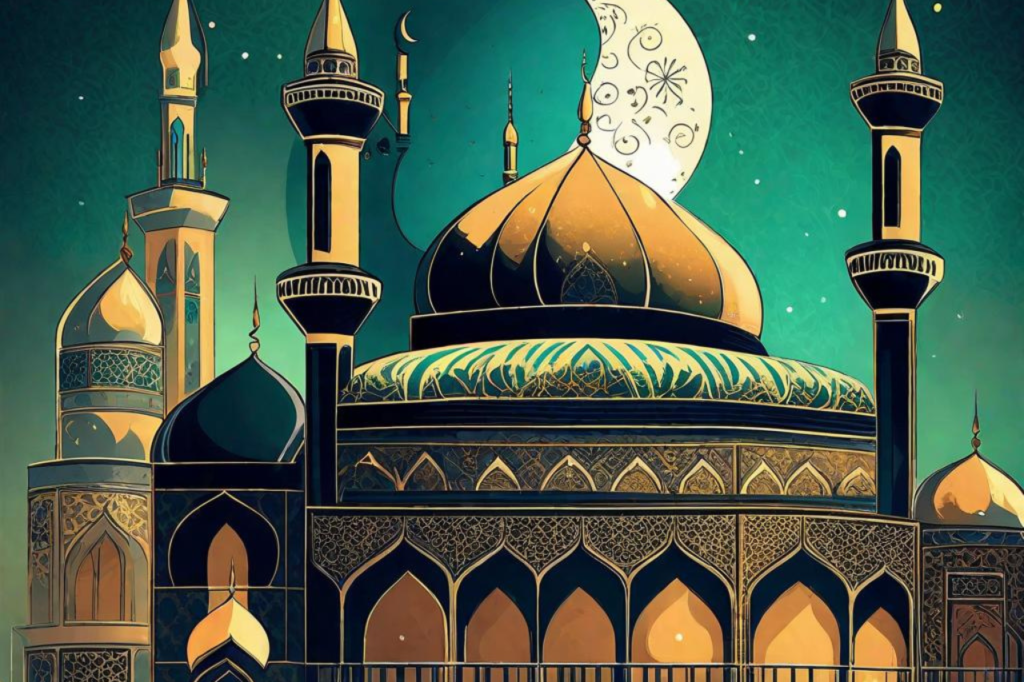Ramadan the holiest month is the ninth month of the Islamic lunar calendar and holds great significance in Islamic tradition. It is a time of fasting, prayer, reflection, and community for Muslims around the world.
The history of Ramadan traces back to the early years of Islam, beginning in the year 610 CE. During this time, the Prophet Muhammad received the first revelations of the Quran from Allah (God) through the Angel Gabriel. This event occurred in a cave on Mount Hira near Mecca, and it marked the beginning of the prophethood of Muhammad. These revelations continued over a period of 23 years, during which the Quran was gradually revealed to the Prophet Muhammad.
The teachings contained within the Quran form the basis of the Islamic faith, guiding Muslims in matters of belief, morality, and conduct. Ramadan, with its emphasis on fasting, prayer, and spiritual reflection, is deeply rooted in the revelation of the Quran and serves as a key practice in Islam.
“O you who have accepted, fasting has been endorsed upon you as it was recommended upon those before you, so that you may attain righteousness – [Fasting for] a set number of days. So whoever among you is sick or on an excursion [during them] – then an equivalent number of days [are to be made up]. What’s more, for the people who are capable [to quick, however with hardship] – a payoff of feeding a poor person [each day]. And whoever volunteers excess – it is better for him. But to fast is best for you, if only you knew.”
Ramadan Cultural Traditions
Preparation and Anticipation:
As Ramadan approaches, Communities around the world prepare for Ramadan, including the excitement leading up to the first day of fasting, purchasing special foods, and decorating streets and homes with lights and lanterns.Families and individuals with excitement and anticipation prepare both spiritually and practically for the upcoming month of fasting. Markets bustle with shoppers purchasing special foods and ingredients for suhoor (pre-dawn meal) and iftar (meal to break the fast). Streets and homes are adorned with colorful lights, lanterns, and decorations, creating a festive atmosphere that symbolizes the beginning of this Holy Month.
Iftar Gatherings:
One of the most cherished aspects of Ramadan is the tradition of Breaking the fast together with family, friends, and neighbors, known as Iftar. Families, friends, and neighbors gather at sunset to share this special meal. The iftar table is often adorned with a variety of delicious dishes ranging from traditional favorites to special treats prepared specifically for Ramadan. The joy of sharing food and blessings with others during iftar strengthens bonds within the community and fosters a sense of unity and generosity.
Taraweeh Prayers:
During Ramadan nights, Muslims engage to perform additional prayers called Taraweeh. These prayers are performed in congregation at mosques and community centers, where worshippers come together to recite portions of the Quran. The Taraweeh prayers provide an opportunity for spiritual reflection, connection, and communal worship. The sense of solidarity experienced during these nightly prayers strengthens the bonds of brotherhood and sisterhood within the Muslim community.
Charitable Giving (Zakat and Sadaqah):
Ramadan is a time of heightened generosity and compassion, marked by the tradition of giving to those in need. Muslims fulfill their religious obligation of Zakat, mandatory charity, by donating a portion of their wealth to those less fortunate. Additionally, they engage in Sadaqah, voluntary acts of charity and kindness, to further support the needy. Communities organize food drives, donation campaigns, and feeding programs to ensure that everyone can partake in the blessings of Ramadan, regardless of their socio-economic status.
Night of Laylat al-Qadr:
The Night of Laylat al-Qadr, also known as the Night of Power, is considered the holiest night of Ramadan. It is believed to be the night when the Quran was first revealed to Prophet Muhammad. Communities mark this auspicious occasion with special prayers, vigils, and sermons held at mosques and homes. Muslims engage in acts of worship and seek forgiveness, believing that the blessings of this night are multiplied manifold. The spiritual significance of Laylat al-Qadr encourages Muslims to strive for self-improvement and draw closer to Allah during this blessed time.
During Ramadan, Muslims fast from dawn until sunset, abstaining from food, drink, smoking, and marital relations. Fasting is seen as an act of worship, a means of self-discipline, and a way to empathize with the less fortunate. It is also a time for increased prayer, Quranic recitation, charity, and acts of kindness.
Ramadan finishes in the celebration of Eid al-Fitr, a joyous festival marking the end of fasting. It is a time of feasting, giving gifts, visiting loved ones, and performing communal prayers.
Throughout history, Ramadan has been observed by Muslims worldwide as a Holy Month of spiritual growth, community bonding, and devotion to Allah. Its traditions and practices continue to be an integral part of Islamic faith and culture.
By DNC

